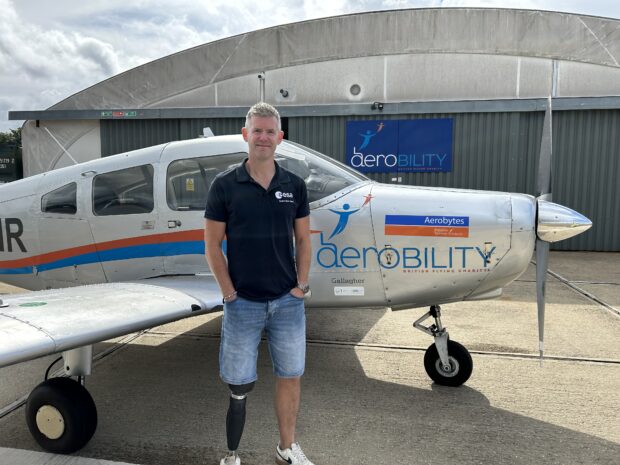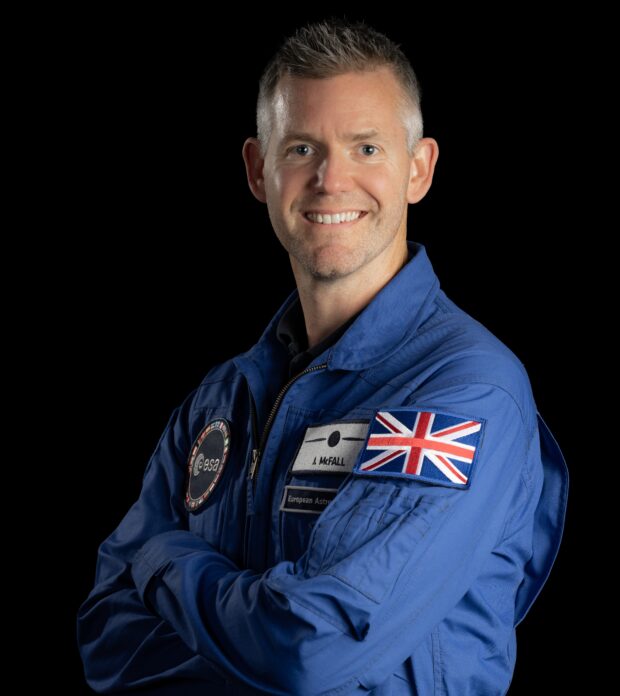John McFall, who could become the world's first astronaut to be assigned to a long duration mission with a physical disability, is training to fly as part of his preparation for a ground-breaking space mission.

John, who is based at the European Astronaut Centre in Cologne, Germany, is back in the UK to assess how his disability could affect Private Pilot Licence training.
The assessment is being conducted with the charity Aerobility at Blackbushe Airport in Hampshire, as part of Fly! Mission Ready, which aims to put in place all the necessary actions to enable John’s potential assignment to a long-duration mission aboard the International Space Station.
The former NHS surgeon was selected by the European Space Agency for a pioneering study on astronauts with physical disabilities in 2022.
He achieved a historic milestone in 2024 by becoming the first person with a physical disability to be medically cleared for long-duration missions to the International Space Station.
John said:
“There's huge crossover between flying light aircraft and working as an astronaut - the judgement calls, task prioritisation, hand-eye coordination and communication skills are all essential for both. By demonstrating that someone with a physical disability can learn to fly, we're showing these essential astronaut skills are absolutely achievable.”

John, who lost his right leg in a motorcycle accident at 19 and went on to win bronze in the 100m sprint at the 2008 Beijing Paralympics before qualifying as a doctor, began the assessment with Aerobility in June and hopes to complete his PPL by October.
He said:
“Aerobility have given me a huge amount of confidence in my journey to being able to fly light aircraft. That's what's so important about that opportunity, about learning to fly - that freedom, that independence that you get from doing that.
“Aerobility provide a platform for people who may not think they have the potential to fly because they have a disability and all of a sudden they can get into an aircraft, learn to fly, and that's a huge confidence builder for them. So for me it's been a great challenge and a great confidence builder.”
Aerobility’s Chief Flying Instructor Al Rosser said:
“It’s been really fun teaching John. He has come here with a real mission, and that’s to try and understand a little bit about airmanship, decision making, priorities, hand-eye coordination, communication – all the good things that they’re looking for in the astronaut programme. And learning how to fly has given him an opportunity to see that at the basic level.
“Obviously John has come here with a prosthetic on his right leg which means that we’ve had to adapt the way that we fly with him, as we do with everybody else – everyone comes with a unique challenge. So although our aeroplanes are adapted for people with no lower limb mobility and we can use a hand control for the foot operated rudder peddles we can work out how it works for John, with the angles, the size of his body and where the peddles are etc, so it’s been really fun trying to find what works for him.”
Neil Tucker, a Trustee for Aerobility, added:
“This is the first time we’ve trained an astronaut but it’s not the first time we’ve had an astronaut with us. Buzz Aldrin opened our hangar in 2015 and Buzz is also a patron of the charity. So we do have space in our DNA.”
Matthew Cook, Head of Space Exploration at the UK Space Agency, said:
“John continues to break down barriers and challenge perceptions about what's possible. His work with Aerobility demonstrates that the skills required for spaceflight - exceptional judgement, coordination, and adaptability - have nothing to do with physical disability.
“The UK Space Agency is proud to support John's pioneering journey, which is not only advancing our understanding of human spaceflight but also inspiring countless people to pursue their dreams regardless of the challenges they face.”
Leave a comment